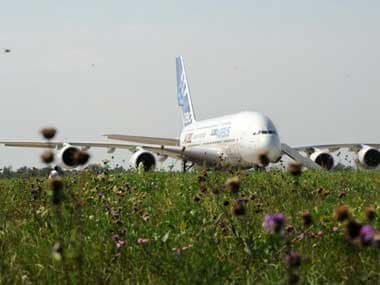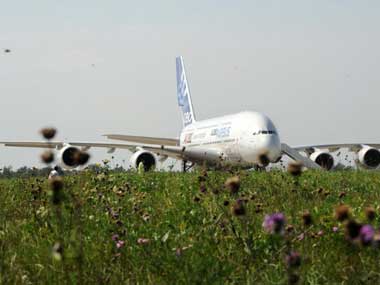No major global airline seems to be keen to immediately fly the Airbus 380 into India, despite the country lifting a ban on this aircraft today. German flag carrier Lufthansa welcomed the Indian Government’s move but said it had no immediate plans to bring in this aircraft. Lufthansa is among the few global airlines which operate A380 in other markets such as USA, China and Japan and had been lobbying the Indian Government for permission to bring in this aircraft for years. “Lufthansa will thoroughly examine the opportunities but currently has no concrete plans for immediate flight operations of this aircraft type to and from India…India is one of Lufthansa’s most important intercontinental markets and the only large aviation market that had restricted the A380,” the airline said in a statement. [caption id=“attachment_1190037” align=“alignleft” width=“380”]
 Airbus A380. AFP[/caption] Singapore Airlines, another carrier, which has A380 in its fleet and was earlier keen to deploy it on flights to India, also played it safe. General Manager India for the airline, David Lau, said,“Singapore Airlines will evaluate the commercial viability of this recent development based on available traffic rights and resources.” Emirates, the Dubai based airline which already carries the largest number of outbound passengers from India and has a little over 54,000 weekly seats, also gave a tepid response to the A380 largesse. “We welcome the decision of the Indian aviation authorities to allow A380 operations. Any decision to deploy an A380 on our network is dependent on passenger demand on that particular route as well as the ability of airports to handle the aircraft…We will be reviewing our existing operations, and look forward to serving Indian travellers with our flagship aircraft in the near future.” India today allowed operation of the world’s largest aircraft but only at four of its airports and that too after airlines fulfill several conditions.Till now, the Government has been resisting A380 landings into the country. Reasons have varied from lack of airport infrastructure to protecting domestic, loss making airlines from sliding further. Both the reasons are bunkum of course. A press release by the Ministry of Civil Aviation this afternoon clearly states that four airports - Delhi, Mumbai, Hyderabad and Bangalore - are equipped fully to receive such a large aircraft. The second reason, which was earlier seen protecting Air India and then other airlines, is also untenable since no country can launch flights in excess of weekly seats allowed under a bilateral air services agreement (ASA). If number of seats are limited, type of aircraft should not make a big difference to outbound traffic from India and its share of foreign carriers. The press release says A380s are allowed now but here’s the catch: 1) The operations of A380 aircrafts would be subject to overall traffic entitlements within the bilateral ASAs with different countries. 2) Wherever the entitlements are not expressed in terms of seats per week, they will need to be rationalized and converted into seats per week first 3) If any Air Service Agreement (ASA) specifically prohibits operation of A380 to India, the same will also be required to be amended before A380 operations from that country are allowed. 4) All designated airports shall have to get DGCA certification first Amber Dubey, partner and head-aerospace and defence at global consultancy KPMG, points out that the A380s will help bring down fares. “They will improve the efficiency and capacity utilisation at Indian airports. This decision will also allow India to get more market access in UAE, Germany and Singapore for Indian goods and services. All in all, a great move that will show benefits in the coming summer season.” But with major airlines shying away, will these benefits accrue anytime soon? Three airlines were earlier interested in bringing these large aircraft into India - Lufthansa, Emirates and Singapore Airlines. And their respective statements suggest none is rushing in. In fact, the decision on revoking the A380 ban comes after airports run by GMR and GVK pushed for this - it was their infrastructure which was getting wasted as the Government dithered. The airlines had been lobbying for years with little success. A statement from Airbus pointed out that the Airbus A380 lets airports maximise efficiency and revenue potential by offering more passenger seats with the same number of flights. The A380 is the world’s quietest large aircraft inside and out, making less than half the noise of its nearest rival around airports. So far, over 120 A380s have been delivered to 10 of the world’s leading airlines.
Airbus A380. AFP[/caption] Singapore Airlines, another carrier, which has A380 in its fleet and was earlier keen to deploy it on flights to India, also played it safe. General Manager India for the airline, David Lau, said,“Singapore Airlines will evaluate the commercial viability of this recent development based on available traffic rights and resources.” Emirates, the Dubai based airline which already carries the largest number of outbound passengers from India and has a little over 54,000 weekly seats, also gave a tepid response to the A380 largesse. “We welcome the decision of the Indian aviation authorities to allow A380 operations. Any decision to deploy an A380 on our network is dependent on passenger demand on that particular route as well as the ability of airports to handle the aircraft…We will be reviewing our existing operations, and look forward to serving Indian travellers with our flagship aircraft in the near future.” India today allowed operation of the world’s largest aircraft but only at four of its airports and that too after airlines fulfill several conditions.Till now, the Government has been resisting A380 landings into the country. Reasons have varied from lack of airport infrastructure to protecting domestic, loss making airlines from sliding further. Both the reasons are bunkum of course. A press release by the Ministry of Civil Aviation this afternoon clearly states that four airports - Delhi, Mumbai, Hyderabad and Bangalore - are equipped fully to receive such a large aircraft. The second reason, which was earlier seen protecting Air India and then other airlines, is also untenable since no country can launch flights in excess of weekly seats allowed under a bilateral air services agreement (ASA). If number of seats are limited, type of aircraft should not make a big difference to outbound traffic from India and its share of foreign carriers. The press release says A380s are allowed now but here’s the catch: 1) The operations of A380 aircrafts would be subject to overall traffic entitlements within the bilateral ASAs with different countries. 2) Wherever the entitlements are not expressed in terms of seats per week, they will need to be rationalized and converted into seats per week first 3) If any Air Service Agreement (ASA) specifically prohibits operation of A380 to India, the same will also be required to be amended before A380 operations from that country are allowed. 4) All designated airports shall have to get DGCA certification first Amber Dubey, partner and head-aerospace and defence at global consultancy KPMG, points out that the A380s will help bring down fares. “They will improve the efficiency and capacity utilisation at Indian airports. This decision will also allow India to get more market access in UAE, Germany and Singapore for Indian goods and services. All in all, a great move that will show benefits in the coming summer season.” But with major airlines shying away, will these benefits accrue anytime soon? Three airlines were earlier interested in bringing these large aircraft into India - Lufthansa, Emirates and Singapore Airlines. And their respective statements suggest none is rushing in. In fact, the decision on revoking the A380 ban comes after airports run by GMR and GVK pushed for this - it was their infrastructure which was getting wasted as the Government dithered. The airlines had been lobbying for years with little success. A statement from Airbus pointed out that the Airbus A380 lets airports maximise efficiency and revenue potential by offering more passenger seats with the same number of flights. The A380 is the world’s quietest large aircraft inside and out, making less than half the noise of its nearest rival around airports. So far, over 120 A380s have been delivered to 10 of the world’s leading airlines.
Lufthansa, Emirates not keen on flying Airbus A380 despite lifting of ban
Sindhu Bhattacharya
• January 28, 2014, 11:22:06 IST
India today allowed operation of the world’s largest aircraft but only at four of its airports and that too after airlines fulfill several conditions.Till now, the Government has been resisting A380 landings into the country. Reasons have varied from lack of airport infrastructure to protecting domestic, loss making airlines from sliding further.
Advertisement
)
End of Article